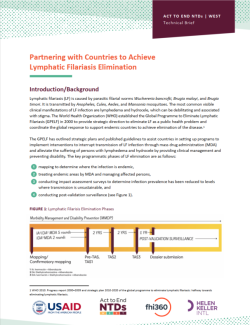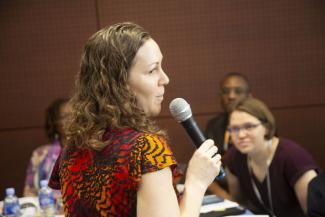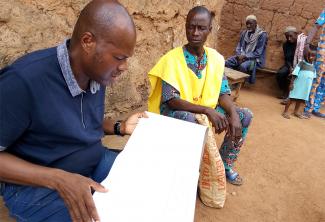Resources

Fiche technique sur l'Amélioration de la Qualité - Sierra Leone
Cette fiche technique explique comment le Programme National de Lutte contre les Maladies Tropicales Négligées de la Sierra Leone a adopté une approche collaborative d'Amélioration de la Qualité dans 10 unités de santé périphériques.

Sierra Leone Quality Improvement Technical Brief
This technical brief discusses how the Sierra Leone Ministry of Health adopted a collaborative quality improvement (QI) approach to enhance community engagement and improve MDA coverage in 10 peripheral health units within the four districts that failed pre-TAS.

Partnering with Countries to Achieve Lymphatic Filariasis Elimination
This technical brief discusses WHO's Global Programme to Eliminate Lymphatic Filariasis (GPELF) and Act | West's approach that is used to support countries to achieve LF elimination.

Applying a quality improvement model to neglected tropical diseases program implementation: supporting programs in identifying keys for sustaining operations
West African neglected tropical diseases (NTD) programs have made great progress toward the elimination/control of NTDs amenable to preventive chemotherapy. However, some districts have failed impact surveys—notably for lymphatic filariasis and trachoma—due to implementation inadequacies, despite reporting good mass treatment coverage. A quality improvement framework has been initiated to strengthen country program interventions and address issues that hinder their ability to achieve the World Health Organization NTD road map elimination/control goals.
The workshop aims to present an innovative model for improving implementation and discuss ideas, strategies, and plans for initiating quality improvement (QI) activities. Experiences from Ghana and Sierra Leone in the design and implementation of the QI model will be shared.
Risk factors associated with failing pre-transmission assessment surveys (pre-TAS) in lymphatic filariasis elimination programs: Results of a multi-country analysis
This paper reports for the first time factors associated with pre-transmission assessment survey (pre-TAS) results from a multi-country analysis. This information can help countries more effectively forecast program activities, such as the potential need for more rounds of mass drug administration, and prioritize resources to ensure adequate coverage of all persons in areas at highest risk of failing pre-TAS.
WHO Lymphatic Filariasis Diagnostic Feedback Form (English)
WHO form to provide feedback on invalid lymphatic filariasis diagnostic tests (English version).
Filariasis Test Strip Irregularity Reporting / Rapportage de irrégularités de FTS
The US Center for Disease Control and Prevention's Caitlin Worrell discussed filariasis test strip irregularity reporting in a bilingual presentation, titled "rapportage de irrégularités de FTS" in French, on January 14, 2020.
Filariasis Test Strip Quality and Reporting
The US Center for Disease Control and Prevention's Caitlin Worrell discussed filariasis test strip quality as a diagnostic tool and reporting issues with the tool on January 14, 2020.

USAID NTD Division - Overview of Lymphatic Filariasis
USAID's Emily Toubali provided an overview of the NTD Division's work on lymphatic filariasis on January 14, 2020

Implication communautaire dans la mise en oeuvre d’une enquête
Le Dr Ernest Mensah de FHI 360 a fait une présentation sur l'implication communautaire dans la mise en œuvre de l'enquête lors de l'atelier de l'USAID sur l'évaluation de la transmission de la filariose lymphatique, organisé par les programmes Act to End NTDs | West et Act to End NTDs | East à Abidjan, Côte d'Ivoire, le 15 janvier 2020.